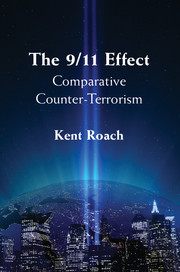Book contents
- Frontmatter
- Brief Contents
- Contents
- Acknowledgments
- 1 Introduction
- 2 The United Nations Responds: Security Council Listing and Legislation
- 3 Countries That Did Not Immediately Respond
- 4 The United States Responds: Executive Power and Extra-Legalism
- 5 The United Kingdom Responds: A Legislative War on Terrorism
- 6 Australia Responds: Hyper-Legislation
- 7 Canada Responds: Border and Human Security
- 8 Conclusions
- Index
- References
2 - The United Nations Responds: Security Council Listing and Legislation
Published online by Cambridge University Press: 05 June 2012
- Frontmatter
- Brief Contents
- Contents
- Acknowledgments
- 1 Introduction
- 2 The United Nations Responds: Security Council Listing and Legislation
- 3 Countries That Did Not Immediately Respond
- 4 The United States Responds: Executive Power and Extra-Legalism
- 5 The United Kingdom Responds: A Legislative War on Terrorism
- 6 Australia Responds: Hyper-Legislation
- 7 Canada Responds: Border and Human Security
- 8 Conclusions
- Index
- References
Summary
Introduction
An assessment of the role played by the United Nations (UN) is critical to understanding post-9/11 changes to global antiterrorism law and policy. Although the UN had selectively engaged terrorism issues before 9/11, the role of the Security Council in leading global counter-terrorism efforts after 9/11 was unprecedented. The Security Council and its Counter-Terrorism Committee (CTC) operated without regard to human rights, especially in the first three years after 9/11. Although the UN leaves states a wide of margin of appreciation with respect to the specific details of their counter-terrorism measures, it threw its considerable influence behind a number of counter-terrorism measures – laws against the financing of terrorism, the use of immigration law as antiterrorism law, and laws against the incitement of terrorism – that can limit human rights and may not be very effective in preventing terrorism. Security Council Resolution 1373, enacted on September 28, 2001, called on all states to enact laws against terrorism financing but also required them to report to a newly formed CTC within 90 days. Many states used the 90-day reporting requirement as a virtual deadline for the enactment of new legislation.
- Type
- Chapter
- Information
- The 9/11 EffectComparative Counter-Terrorism, pp. 21 - 76Publisher: Cambridge University PressPrint publication year: 2011



